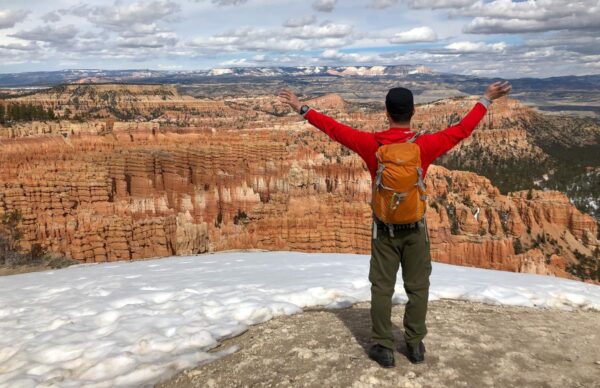The COVID-19 pandemic probably brought new light to the importance of tourism for many out-of-towners, but for residents of Garfield County, keeping up with tourism has always been a way of life for our community. It hasn’t, however, been a way of life we always like.
For example, tourists are a real pain when they cause traffic, keep us busy gathering odd supplies or complain about the cows.
In addition, there can be issues with communities that depend too much on tourism, but there is also a lot of value to tourism if we keep the focus on community. Tourism stimulates our economy, shows us different points of view, and provides us with opportunities for risk-taking: valuable assets for a small town in Rural Utah.
Economy
Tourism accounts for about 10% of the global GDP, and the industry is expected to grow. Utah is a big part of that. A report from the University of Utah stated that “travel and tourism is one of Utah’s top ten industries, supporting one in 11 Utah jobs and generating over a billion dollars in state and local tax revenue annually.” It also accounts for about 80% of the economic activities in rural Garfield County.
Just in Bryce Canyon alone, there are over 80 touring and photography companies authorized to do business inside the park, over 45 nearby lodging establishments and campsites, and at least 10 restaurants. And there is still demand for more! Most people in the community are connected to tourism in one way or another.
That’s a lot of people who depend solely on others’ travel for a living. And thus far we still need tourism in our little community, but that doesn’t mean it has to change our values. In fact tourism can really complement Southern Utahns’ values in good ways.
Different Points of View
In addition to stimulating the economy, tourism also stimulates our points of view and gives us a more nuanced view of how we fit into the world around us.
A lot of the most eye-opening stories I’ve heard come from my parents, leaders and teachers and focus on gaining different points of view from tourists.
Many of us have had opportunities to greet the tourists and teach them a little bit about who we are and where we come from. We share information about different trails and restaurants in the community. We talk about religious and political views matching and unmatching with people from all over the world. A Vietnamese man even once taught my mom the secret to a happy marriage: you don’t always have to be right … even if you are.
Not every small town gets the chance to have conversations with people from all over the world every day. But we do, and it’s given us respect and knowledge of different cultures — if we’re willing to receive it — as well as a chance to defend our own.
Risk Taking
Unfortunately as the COVID-19 pandemic proved, tourism can be quite a fragile industry. It depends a lot on external sources that are out of business’ control for them to stay afloat. Although, it is still a pretty lucrative industry.
Now, there is value in giving the community other opportunities outside of tourism to work in. And I think we have worked on that. Remote work, hospital work, building and other infrastructure jobs are growing in our communities. As the world changes, so do we.
But there is still a lot of value in the tourist jobs for the chance to take risks — calculated risks, that is. “The difference between risk-takers and calculated risk-takers is the difference between failure and success,” said Leonard C. Green, an entrepreneurship mentor.
Getting involved in the tourist business is a calculated risk, depending on some outside factors, yes, but also one’s ability to draw tourists to a certain location through attractive spaces and unique brands. According to that definition, the best way to draw tourists is to highlight what makes Cannonville, Utah, or Escalante, Utah, or Tropic, Utah, or Panguitch, Utah, what they are. That’s a risk we can take, and it is a very fulfilling one, that can create very successful generational businesses.
Being a Community
When all is said and done, however, we still have to come home, at the end of the day, and be a community. It’s important that besides all of the tourist activities, we don’t forget who we are and who we came from. And maybe the perfect tourist attraction is one that isn’t too afraid of what it is, or who it is, to be themselves.
Importantly, tourism works only if we’re willing to take advantage of the opportunities, and be ourselves while doing it. Tourism should preserve the communities it comes from and provide opportunities for locals to get involved, talk to and understand the tourists and take risks to be able to bring the tourists.
If the community does that, tourism can be a sustainable business that stimulates the economy, shows us different points of view and provides us opportunities for risk-taking. If it doesn’t, it just becomes another touristy hub killing off any community or culture that was once there.
– by Abbie Call
Feature image caption: A tourist looks out over Bryce Canyon. Courtesy Jason Wong.

Abbie Call – Cannonville/Kirksville, Missouri
Abbie Call is a journalist and editor at The Byway. She graduated in 2022 with a bachelor’s degree in editing and publishing from Brigham Young University. Her favorite topics to write about include anything local, Utah’s megadrought, and mental health and meaning in life. In her free time, she enjoys reading, hanging out with family, quilting and hiking.
Find Abbie on Threads @abbieb.call or contact her at abbiecall27@gmail.com.

